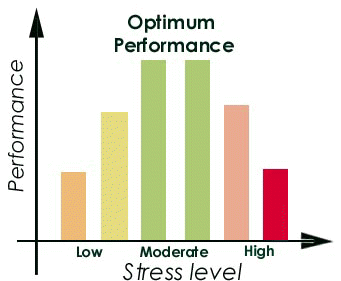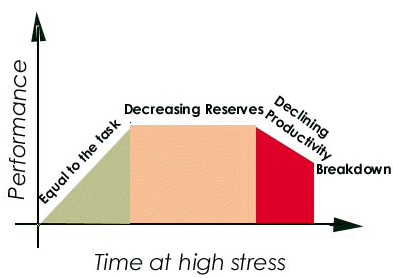|
Cardinal qualities to enter
the optimum stress bracket
The grace to accept with serenity the
things that cannot be changed
The courage to change the things
which should be changed
The wisdom to distinguish one from
the other.
_____________________
Understanding
the Importance of Optimum Stress Levels
Ever
wonder how some people, with incredibly busy lives and multiple
responsibilities, seem to take their stress in stride while other people, with
even fewer responsibilities seem to fall apart under the least bit of
pressure? We can begin to understand this paradox when we begin to understand
the power of control. The power to function within the optimum stress bracket.
The
level of stress under which you operate is important: if you are not under
enough stress, then you may find that your performance suffers because you are
bored and unmotivated. If you are under too much stress, then you will find
that your results suffer as stress related problems interfere with your
performance.
People
who feel in control of their lives are invigorated and challenged by their
busy schedules. People who don't feel in control, often report being
"overwhelmed" by the stresses of life. This second group tends to
see problems as unsolvable and obstacles as insurmountable. But the first
group believes there is a solution to every problem and a way around any
obstacle.
It
is important that you recognise that you are responsible for your own stress -
very often it is a product of the way that you think. Learn to monitor your
stress levels, and adjust them up if you need to be more alert, or down if you
are feeling too tense. By managing your stress effectively you can
significantly improve the quality of your life.
This
section explains the linkage between being in control of stress and
performance, and shows how you can ensure that you perform at your best by
optimising stress levels.
The
approach to optimising stress depends on the sort of stress being experienced:
- Short
term stress such as difficult meetings, sporting or other performances, or
confrontational situations. Here the emphasis is on short term management
of adrenaline to maximise performance.
- Long
term stress, where fatigue and high adrenaline levels over a long period
can lead to degraded performances. Here optimising stress concentrates on
management of fatigue, health, energy and morale.
Naturally
there is some element of overlap between these.
Short
term stress
The
graph below shows the relationship between stress and the quality of
performance when you are in situations that impose short term stress:

(Please
note that this graph will be a slightly different shape for different people
in different circumstances)
Where
stress is low, you may find that your performance is low because you become
bored, lack concentration and motivation.
Where
stress is too high, your performance can suffer from all the symptoms of short-term
stress.
In
the middle, at a moderate level of stress, there is a zone of best
performance. If you can keep yourself within this zone, then you will be
sufficiently aroused to perform well while not being over-stressed and
unhappy.
This
graph, and this zone of optimum performance are different shapes for different
people. Some people may operate most effectively at a level of stress that
would leave other people either bored or in pieces. It is possible that
someone who functions superbly at a low level might experience difficulties at
a high level. Alternatively someone who performs only moderately at low level
might perform exceptionally under extreme pressure.
Long
term stress
Are you
going great guns, with all cylinders firing?
Driving on
the fast lane gives one a heady feeling, but the question arises - how long
will the gas last?
However
big your tank might be if you dont stop for a refill, sooner rather than later
you will start running out of gas. But its never too late, shift to a slower
lane and stop over at a nearby gas station or else very soon you would be
stranded without gas that too on a high speed 120 miles/hour track. Stranded
to become history - a hit and run case.
The
problems of long term, sustained stress are more associated with fatigue,
morale and health than with short term adrenaline management.
The
graph below shows the way in which performance can suffer when you are under
excessive long term stress:

The
graph shows four major stages that you may go through in response to sustained
levels of excessive stress:
1. All
cylinders firing: During
the first phase you will be up to the task and face challenges with plenty of
energy. Your response will probably be positive and effective.
2. Running
out of gas: After a
period of time as your energy reserves decrease you may begin to feel
seriously tired. You may start to feel anxious, frustrated and upset. The
quality of your work may begin to suffer.
3. Stranded
without gas: As
high stress continues you may begin to feel a sense of failure and may be ill
more frequently. You may also begin to feel exploited by your organization. At
this stage you may start to distance yourself from your employer, perhaps
starting to look for a new job.
4. A
hit and run case: If
high levels of stress continue without relief you may ultimately experience
depression, burnout, nervous breakdown, or some other form of serious stress
related illness.
Different
people may move between these stages with different speeds under different
stress conditions.
High
performance in your job may require continued hard work in the face of high
levels of sustained stress. If this is the case, it is essential that you
learn to pay attention to your feelings. This ensures that you know when to
relax, slacken off for a short period, get more sleep, or implement stress
management strategies. If you do not take feelings of tiredness, upset or
discontent seriously, then you may face failure, burn-out or breakdown.
As
well as paying attention to your own stress levels, it may be worth paying
attention to the stress under which people around you operate. If you are a
manager seeking to improve productivity, then failing to monitor stress may
mean that you drive employees into depression or burn-out. If this is a
danger, then reduce stress for long enough for them to recover, and then
reconsider the pace you are setting.
At the other extreme it is also important to maintain some pressure or else
the effects of monotony and lack of challenges will start taking toll.
Encouraging employees to get
organized, both at home and at work can also help them feel more in control.
Whether that means working from a clean desk, tidying one's car, or working
from a list of things to do, these techniques (which as a trainer you may take
for granted) can give a person a much greater sense of control over his stress
levels.
Finding
your optimum stress levels
The
best way of finding your optimum level of stress is to keep a stress diary for
a number of weeks.
_________________________________________________
Next
Up - How
to maintain a stress diary? |
